Gregg rulz, OK?
Video games have a spotty history when it comes to addressing mental health. Often, people with mental health issues are demonized, portrayed as the nefarious villains in games like Outlast or Far Cry 3. In other games, mental health is reduced a sanity meter or other mechanic, such as in Amnesia or Darkest Dungeon. But 2017’s Night in the Woods presents a different way of looking at mental health in games.
Night in the Woods is an indie platformer that focuses on Mae, a 20-year-old cat who drops out of college and returns to her dying hometown. After she reconnects with her childhood friends, Mae begins having disturbing dreams that lead her to investigate a sinister mystery that has plagued the town for decades.
On the surface, Night in the Woods seems like a fun mystery game about a group of friends, but it’s actually about learning to cope with mental illness.
[referenced url=”https://www.kotaku.com.au/2017/02/night-in-the-woods-the-kotakureview/” thumb=”https://i.kinja-img.com/gawker-media/image/upload/t_ku-large/fuyt3t04qpvrudy8dwjd.gif” title=”Night In The Woods: The Kotaku Review” excerpt=”Depending who you are, you’ll either want to hang out with Night in the Woods’ characters all the time or tell them to get off your lawn. The game is small enough to feel intimate and spacious enough to cater to different kinds of curious people. It may feel different for everyone who plays it.”]
The game’s creators have spoken candidly in the past about their own mental health struggles. Scott Benson, who animated and illustrated the game, has type two bipolar disorder. Programmer Alec Holowka runs the Everybody’s Fucked Up podcast, which aims to break through stigma around mental illnesses by interviewing people who have experienced them. (Bethany Hockenberry, the writer of the game, was unable to meet with Kotaku for an interview.)
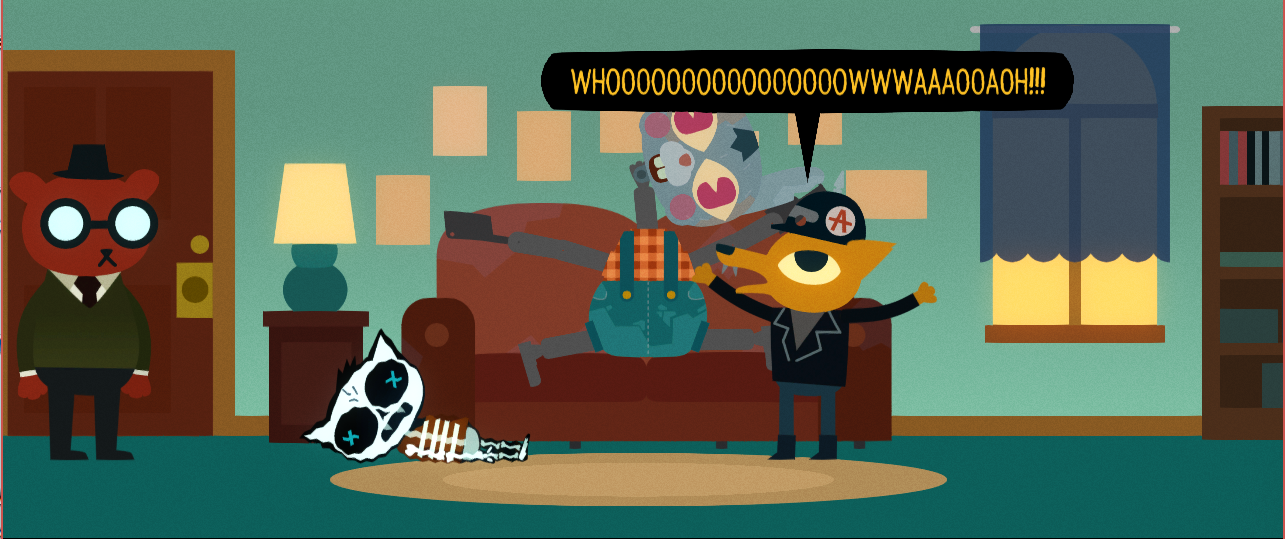
Mae and Gregg are doing crimes again, much to the confusion and dismay of Angus.
Night in the Woods explores mental health through the lives of Mae and her friends Bea, Gregg, and Angus. Mae, the protagonist, experiences depression and anxiety, which sometimes create dissociative states during which she becomes completely disconnected from reality.
It is implied, though never directly stated, that Gregg has bipolar disorder. His poor impulse control gets him into bad situations, and at times these factors impact his feelings of self worth. Bea and Angus both struggle with the consequences of abusive pasts and their relationships with their families.
Benson told Kotaku that the team intentionally left the characters’ mental health ambiguous as a way to let the story progress naturally. Early in development, they knew they wanted to talk about depression, since everyone on the team had experienced it in some way. Ultimately the team wanted to make a game about people who experience mental health issues, not the issues themselves.
“I wasn’t seeing a lot of games doing it [exploring these issues] so that kind of made it an interesting thing to explore,” Holowka explained. “And it kind of fit with the idea of doing this generally down-to-earth subject matter compared to a lot of games that are more about like, characters that are super powerful. Our characters aren’t that powerful … which I think is also interesting and relatable.”
The characters’ hometown of Possum Springs also impacts their mental health and access to care. Possum Springs is a former mining town that is facing economic decline. Mae is infamously known for beating up a boy for seemingly no reason when she was in high school.
At the time, she was reacting to an episode of depersonalization that caused her to see the world in “shapes” and disconnect from reality. Her problems were reduced to her simply having “anger issues,” and, after the incident, she had to start seeing the town doctor to treat them.
Dr. Hank didn’t help Mae work through her anger; instead he actively encouraged her to suppress it. Mae’s experience with Dr. Hank highlights a problem in smaller rural communities where mental health resources are not easily accessible.
“Even when you have access to mental health care, sometimes you end up with a bad doctor or you just don’t have access to the kind of care you need,” Benson explained. “And so, putting Mae in that kind of situation reflected the actual reality of the incident in a lot of places where there’s just not someone there that you can go to.”
Similarly, Mae drops out of college to take care of her mental health. A 2012 survey by the National Alliance on Mental Illness found that 64% of college students with mental health issues drop out.
Young adults experiencing mental health issues are more likely to have lower GPAs or be unemployed in comparison to their peers who don’t face these issues. Night in the Woods highlights a huge problem with college students not getting access to necessary services, which leaves students like Mae to sink or swim.
While the characters may struggle to access care, they fill that void by supporting each other. It’s obvious that something has caused Mae to drop out of college, but she doesn’t talk about it for much of the game.
Although it takes Mae a long time to open up to her friends about what she’s been dealing with, when she does, her friends offer support. They talk about her experiences and share their own. For example, If you choose to go shooting with Gregg, he talks about his uncertainty as to whether or not he’s a good person.
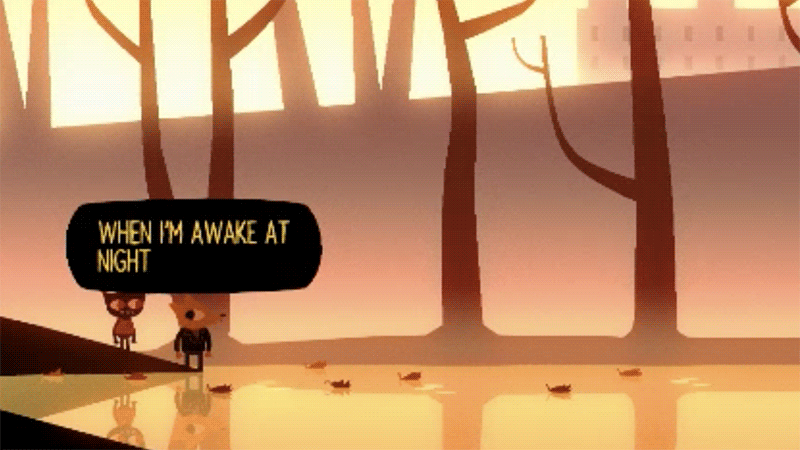
Gregg talks about his low self esteem and his anxiety about how he might one day lose Angus because of who he is as a person.
In the characters’ conversations, their mental illnesses are validated, and their concerns are met with compassion rather than scorn, such as when Mae comforts Gregg about his insecurities while they’re hanging out in the woods. This is true even when their behaviour hurts others. For instance, in the beginning of the game, Mae, can be self-centered, judgmental, and a little immature. Holowka mentions that some players get frustrated about the decisions that Mae makes in the game.
“There’s certain situations where Mae kind of fucks up, and I’ve seen some reactions from players who identify with that and some that are really frustrated, like ‘I wouldn’t do that!’” Holowka said. “But I think that’s part of the experience sometimes of mental health, that you don’t necessarily feel like you can make the best decisions all the time. That there’s some aspect of you that’s going to make a bad decision, and you’re kind of struggling with that.”
Benson and Holowka said that they were surprised by how much fans were impacted by the game when it came out. They attended PAX shortly after NITW was released, where they were swamped with fans who came by to share their experiences.
Even months after the game’s release, players continued to share how important the game was to them. Benson said that he and Hockenberry were recently in Portland, where they met someone who experiences depersonalisation and said that they had never seen those issues depicted in media.
“I think sometimes that’s just cool, because representation is just like ‘Oh that’s nice to see,’ and that may be empowering or it may give you some solace,” Benson said. “But I think for a lot of people that representation is important because it could just be the only time that anyone has ever verified and validated that experience.”
Benson even said that some fans have told him that they realised they needed to get help for mental health struggles after playing the game. He says that the game gave them “permission” to do it.
“Permission doesn’t mean an authority figure or that they need to check with us, but like, sometimes you just need to have someone say this is a thing that occurs in your life and it’s ok. You’re not like, broken or something,” Benson said.
“This does not mean that you’re irrevocably busted and have to be quarantined or something, because you may want to quarantine yourself a lot of the time. There have definitely been people who have explicitly said, ‘Night in the Woods was there for me in a time when I was really desperate or kind of on that ledge.’ Sometimes literally.”
But fans haven’t just been reaching out to the developers for support. They have also been connecting with each other. On message boards and discussion forums such as Steam, players have talked to each other about their experiences.
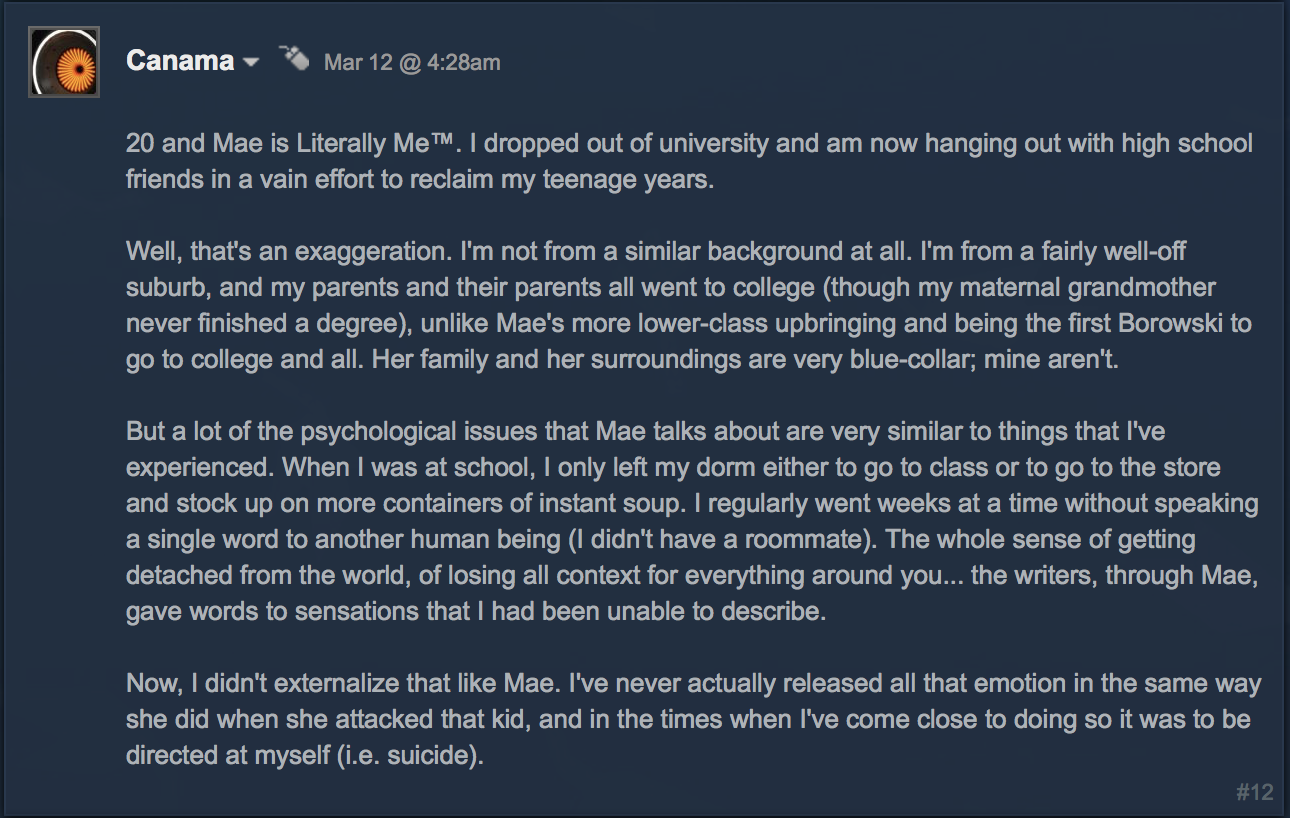
One user talks about how they related to Mae’s experience of needing to leave college due to mental health issues.
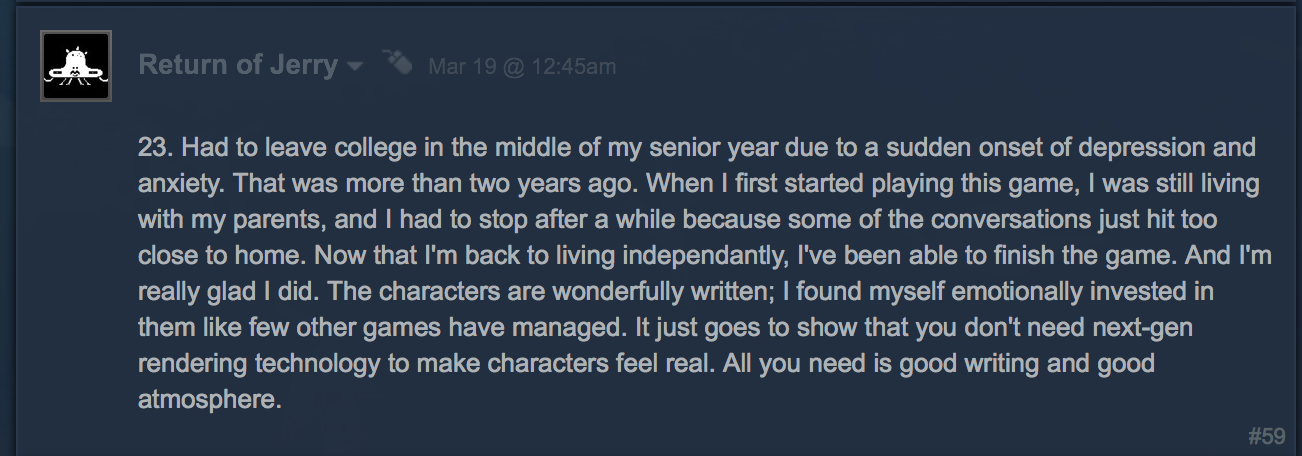
Another user talks about how deeply he was impacted by the game.
“I think that one of the things that the game is doing that I wasn’t expecting it necessarily to do is creating a way for people to connect with each other,” Holowka said. “I’m just so grateful that that’s been something that’s happening.”
Holowka wants Night in the Woods to be a conversation starter, even if players don’t connect personally with the characters’ struggles.
“I hope that it will at least have kind of left a crack in their perception of people like me who are going through shit,” he said.
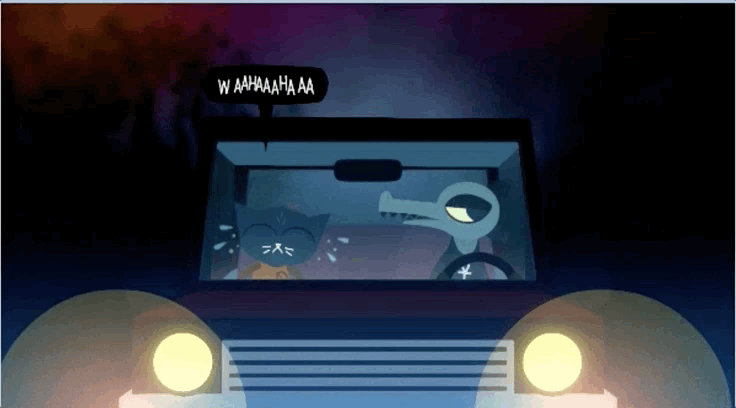
Bea and Mae’s relationship is strained at the beginning of the game, but slowly, they work to repair their friendship.
Benson says he ultimately wants players to have faith that there are solutions to problems.
“The idea is that there are some things that are really bad out there and there’s a lot of black holes that are innately devoid of meaning that you have to work to fulfil, but you don’t have to give up because of that,” Benson said. “There is hope. And sometimes that just means focusing on the day to day.”
Night in the Woods is currently available on Steam, and you can also follow the game on Twitter, where you can find updates and adorable fanart.
If you or someone you know is suffering from depression or just needs someone to talk to, you can contact the following services: Lifeline Australia at 13 11 14; beyondblue at 1300 224 636; eheadspace (for young people aged 12-25) at 1800 650 890; MensLine Australia at 1300 78 99 78; the MindSpot Clinic at 1800 61 44 34 or PANDA at 1300 726 306. QLife also has a hotline and online service dedicated to supporting members of the LBGTI community, and the Kids Helpline offers 24/7 support for kids and adults aged 5-25, as well as advice to parents and carers.
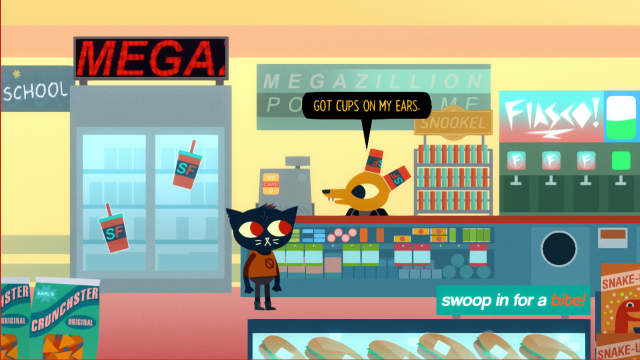
Comments